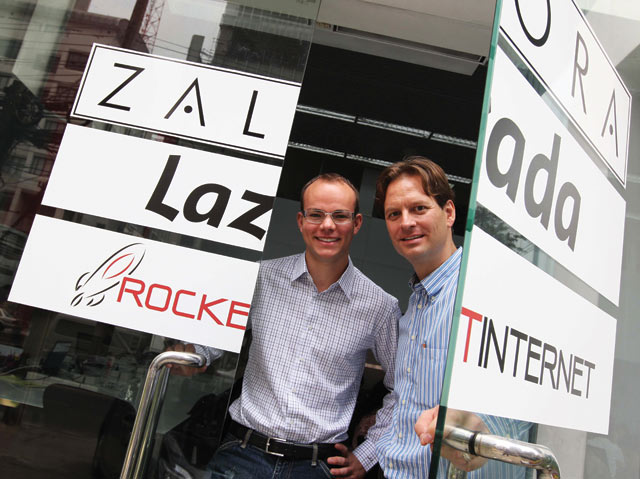One of Europe’s most aggressive website copycats is bringing some much needed competition to e-commerce in Southeast Asia
By Peter Janssen
Rocket Internet GmbH, a German start-up incubator that has made a fortune cloning successful website business models, is doing some original spade work for e-commerce in Southeast Asia.

The group known for its copycat strategy has been quietly setting up companies and hiring staff in Indonesia, Malaysia, the Philippines, Singapore, Vietnam, Taiwan and Thailand in recent months to operate its new e-commerce site Zalora, specialising in fashionable brand-name products.
Zalora, modelled after Rocket Internet’s German Zalando fashion site – very similar to US e-entrepreneur Nick Swinmurn’s Zappos site now owned by Amazon – offers more than 400 brand-name items to online shoppers in Southeast Asian countries at reasonable prices with free delivery.
In Thailand, where Zalora Thailand Ltd has been operating for several months and now boasts a staff of about 100, items are either delivered by motorcycle or posted, with payments made in cash or via bank transfers.
“We are aware that in Thailand not so many people use credit cards, and some are reluctant to use credit cards online, so we are providing other channels,” said Julian Leither, Zalora Thailand’s managing director.
The site offers both international and local brand name clothing and shoes for women and men, with a 30-day sampling period during which customers can get their money back if not satisfied.
Pioneers of Thailand’s e-commerce market are welcoming the German newcomer, which already operates multiple e-commerce companies for shoes and fashion in Germany, Japan and Australia.
“At the end of the day, there is a lot of room in the market and it’s great to have these other companies that are basically trying to solve some of the problems we all face, like how do you get more people to use e-commerce,” said Paul Srivorakul, co-founder and chief executive of Thailand’s Ensogo Group and Admax Network, two pioneering e-marketing and advertising sites.
In 2010, the percentage of Thai internet users shopping online increased 9.4% from 2009 to 57.2%
Rocket Internet’s knack for imitating and tailoring successful Silicon Valley websites to local markets in Europe, Australia and now Southeast Asia, does not threaten Srivorakul.
“At this stage, it doesn’t really matter,” Srivorakul said. “These guys have a model that works for them.”
“These guys” are three German brothers – Oliver, Marc and Alexander Samwer – whose first internet imitation was a German version of eBay, launched in 1999 and sold for $50m. Since then, Rocket Internet has gone on to copy a handful of websites and launch them internationally, adapting to local needs, such as Amazon rip-off Lazada and Pinspire, an unabashed replicate of the US-based social photo-sharing site Pinterest.
While the company lacks visionary development, it excels in efficacy. It is known for building and scaling web services quickly and successfully. The most notable of the Samwer brothers’ clone companies was CityDeal, which it sold to coupon giant Groupon for $126m.
While tech purists may lament the Samwer business model, the brothers understand that end users are more concerned with goods and services on offer than originality. They are hoping to boost e-commerce in the region while plugging the gap in the diverse Asean market by localising its websites to individual countries.
The Zalora Thailand website, for instance, is in Thai and offers a stable of Thai brand fashion items, as well as using Thai website designers, motorcycle delivery boys and the local postal service.
The company has a mission to make high-fashion available not just in Bangkok, but to provincial buyers.
“The focus is actually outside Bangkok, because outside Bangkok most people are going to have problems finding nice department stores,” said Peter Kopitz, Zalora’s director of operations. “So we are offering solutions for all of Thailand.”
Although Zalora claims to have no local competitors, industry sources said the site could potentially take customers away from Thailand’s upmarket department stores such as the Central Group and Mall Group.
“For Central Group about 60% of their purchases come from outside Bangkok,” Srivorakul said. “People don’t have access to the shopping malls, so e-commerce is a great way for them to discover new brands.”
One of the great things about shopping at mall outlets is the absence of pirated brand names, which are rife in Thailand.
Zalora boasts the same claim. “We have only original brand products,” Leitner said. “No fakes.”
